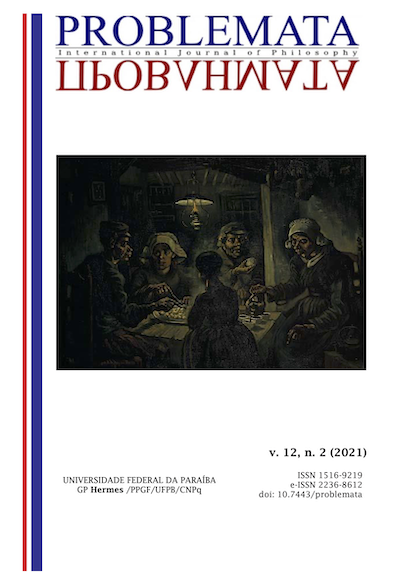A NOTE TO KANT’S TRANSCENDENTAL AESTHETIC
DOI:
https://doi.org/10.7443/problemata.v12i2.58718Keywords:
Criticism, Epistemology, Transcendental Aesthetic, KantAbstract
Transcendental aesthetic is presented as the doctrine of the a priori possibility of finite knowledge, and not as the problem of the possibility of synthetic a priori knowledge. The doctrine of space and time, the heart of Kant’s theory of knowledge, ensures not only the unity of a sensitive consciousness hic et nunc with respect to a new ontology, but also seems to demonstrate Kant’s conviction that a priori synthetic knowledge of the soul, the world and God is impossible. Paradoxically, and transcendental aesthetic is the best example, the very architectonic of the faculties becomes a much more gnoseological task than could be expected from a cosmopolitan philosopher like Kant.
Downloads
References
CANO DE PABLO, J. La evolución de los conceptos de espacio y tiempo en los escritos precríticos de Kant. Convivium (19), 23-44. 2006.
CICATELLO, A. Antropologia come “general Weltkenntniß” Kant e la concezione cosmica dell’umano. Con-Textos Kantianos (8), 377-392. 2018.
CILVETI, A. La génesis de la doctrina del espacio en Kant. Convivium (9-10), 3-42. 1960.
COBLE, D. Lo a priori trascendental en Kant (una investigación lógico-conceptual). Factótum (9), 43-122. 2012.
DELEUZE, G. Cuatro lecciones sobre Kant. Santiago: Escuela de Filosofía Universidad Arcis. 1978.
DICKIE, G. El siglo del gusto. Madrid: Machado. 2003.
FRADES, C. El objeto trascendental kantiano. Tesis de grado. San Cristóbal de La Laguna: Universidad de La Laguna. 2019.
GARBER, D. & LONGUENESSE, B. Kant and the Early Moderns. Princeton N.J.: Princeton University Press. 2008.
KANT, I. La ‘Dissertatio’ de 1770: sobre las formas y los principios del mundo sensible y del inteligible. Madrid: Consejo Superior de Investigaciones Científicas. 1961.
KANT, I. Transición de los principios metafísicos de la ciencia natural a la física (Opus postumum). Madrid: Nacional. 1983.
KANT, I. Antropología en sentido pragmático. Madrid: Alianza. 1991.
KANT, I. Crítica de la razón pura. Madrid: Alfaguara. 1998.
KÖRNER, S. Kant. Madrid: Alianza. 1977.
LONGUENESSE, B. Kant and the Capacity to Judge. Princeton N.J.: Princeton University Press. 1998.
LONGUENESSE, B. Kant on the Human Standpoint. Cambridge: Cambridge University Press. 2005
MARTIN, G. Kant. Ontología y epistemología. Córdoba: Universidad Nacional de Córdoba. 1971.
MARTÍNEZ MARZOA, F. De Kant a Hölderlin. Madrid: Visor. 1992.
ROHS, P. Transzendentale Ästhetik. Meisenheim am Glan: Verlag Anton Hain KG. 1973.
SEHNEM, C. A imaginação e a construção doutrinária da Estética Transcendental. Studia Kantiana, 16 (1), 129-154. 2018.
SOTO, C. Kant. La imaginación: Propuesta para una lectura confusa de la Deducción Trascendental y de otros pasajes de la Crítica de la razón pura. Tesis de grado. Santiago: Universidad de Chile. 2005.
TORRETTI, R. Manuel Kant. Estudio sobre los fundamentos de la filosofía crítica. Buenos Aires: Charcas. 1980.
Downloads
Published
Issue
Section
License
Copyright (c) 2021 Leopoldo Tillería

This work is licensed under a Creative Commons Attribution 4.0 International License.
Authors who publish with this journal agree to the following terms:
- Authors retain copyright and grant the journal right of first publication with the work simultaneously licensed under a Creative Commons Attribution License that allows others to share the work with an acknowledgement of the work's authorship and initial publication in this journal.
- Authors are able to enter into separate, additional contractual arrangements for the non-exclusive distribution of the journal's published version of the work (e.g., post it to an institutional repository or publish it in a book), with an acknowledgement of its initial publication in this journal.
-
- Authors are permitted and encouraged to post their work online (e.g., in institutional repositories or on their website) prior to and during the submission process, as it can lead to productive exchanges, as well as earlier and greater citation of published work (See The Effect of Open Access).





